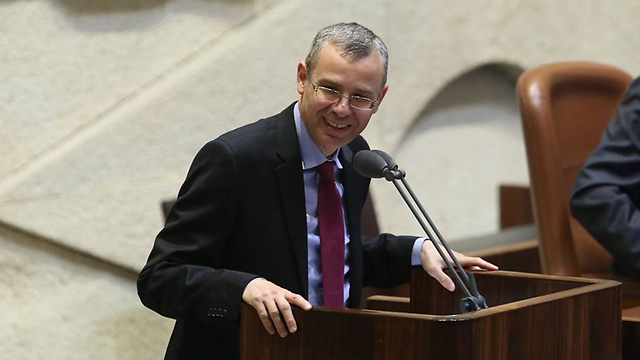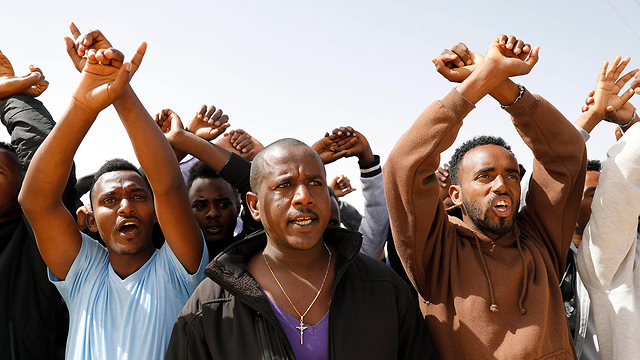Prime Minister Benjamin Netanyahu and Education Minister Naftali Bennett clashed Wednesday afternoon in a meeting of coalition heads convened to discuss the possibility of enacting a "notwithstanding clause" aimed at preventing the High Court of Justice (HCJ) from striking down legislation.
The idea was floated recently in response to the thwarting of a plan to expel illegal African migrants.
The clause was brought up as possible solution to amending a law preventing migrant infiltration into Israel that would allow for the detention and expulsion of illegal mirgants.
While Prime Minister Netanyahu announced his intentions to promote a far-reaching version of the move—contrary the stance of Finance Minister Moshe Kahlon, who was absent from the meeting—he was confronted by Bennett regarding the speed with which the notwithstanding clause was to be promoted.

"Let's convene the Ministerial Legislation Committee this afternoon to approve the wider notwithstanding clause. It's time to go from words to actions," the education minister said during the meeting,
The premier, however, refused and said alternative options should be reviewed first, to which Bennett retorted, "Years have passed, it's now time to decide. I fear that if we are not determined, it will be sending a wrong message to both infiltrators and the world."
Interior Minister Aryeh Deri then interjected to claim that doing so "may harm the High Court's response on Uganda," a reference to a deal to deport migrants there against their will.
"That's not worth anything because it will collapse," Bennett replied. "The notwithstanding clause is the solution."
While the prime minister agreed with his education minister's assertion, he nevertheless refused to convene the ministerial committee.

Tourism Minister Yariv Levin then offered to promote a "British solution, regarding the court's inability to strike down laws." When Bennett asked whether such a solution was on the table, Levin and Netanyahu admitted that it was not.
"Okay," Bennett continued, "then let's convene the Ministerial Legislation Committee today and pass the notwithstanding clause. If not today, go figure when it will happen. If the British solution is on the table, I'm announcing my support of it in advance."
According to the British model of the notwithstanding clause, the High Court can bring constitutional difficulties to the attention of the legislature, but it cannot outright strike laws down.
Attorney General Avichai Mandelblit has not yet been required to issue his own opinion on the matter. A source in the Justice Ministry presumed he will only agree to enacting a notwithstanding clause within the framework of Basic Law: Legislation, which will precisely define the interplay between the state's authorities.
In such an eventuality, Mandelblit will indeed support legislation regulating the High Court's authority to strike down any laws for harming rights, but only as long as the Knesset's power to reenact the same law requires at least a 70 MK majority—rather than the 61 MK majority both Bennett and Justice Minister Ayelet Shaked are pushing for.

A source close to Kahlon said the minister had spoken with the prime minister's Chief of Staff Yoav Horowitz and communicated to him his position regarding the migrants. Kahlon has reiterated that his Kulanu party will only support a specific notwithstanding clause to urgently deal with the migrant crisis.
The prime minister, for his part, said he supports Levin's proposed British model. The coalition heads will convene again this Sunday to promote legislation in a rapid-fire fashion, a statement on behalf of the prime minister said.
"There's a readymade British model that will be discussed Sunday. None of the coalition heads apart from Bennett asked to convene the Ministerial Legislation Committee today, since Bennett's suggestion is weaker than the one coalition heads are now seeking to promote," a source close to Netanyahu said.
Levin added, "We may need to reach a compromise later on to pass the law in the plenum, but I believe a wider solution should be sought to engender a wider consensus. Seeking only a specific notwithstanding clause today will only cause harm, because it will not stand up to the court's scrutiny, as the notwithstanding clause in the draft law failed."
Public Security Minister Gilad Erdan tweeted his support of the prime minister on the issue. "We have a historic opportunity to repair the balance between the authorities, which has shifted. We have the opportunity to bring back the ability to decide and govern, which has been damaged due to the 'everything is justiciable' policy. Not everything is justiciable!" he wrote.
"There are national matters on which the people expect their elected officials to decide without the intervention of anyone. Basic Law: Legislation must be enacted, alongside a far-reaching notwithstanding clause," Erdan continued.
A hearing was held in the High Court Tuesday on the possibility of deporting migrants to a "third country" in Africa—meaning Uganda—after a similar agreement with Rwanda on the matter collapsed and Netanyahu annulled an agreement reached with the United Nations to transfer half of the migrants to Europe and allow the remainder to stay in Israel.
The High Court's justices criticizes the state's representatives to the hearing, finally determining that all 207 remaining asylum seekers incarcerated in the southern region Saharonim facility are to be released within five days, unless Attorney General Mandelblit authorizes the agreement reached with Uganda to take them in.
The interim order blocking the expulsion thus remained in place for two additional weeks, during which time the state will be allowed to formulate policy regarding the "third country."
By so doing, the court's justices left an opening for the submission of new appeals the moment such a policy is promulgated.



















